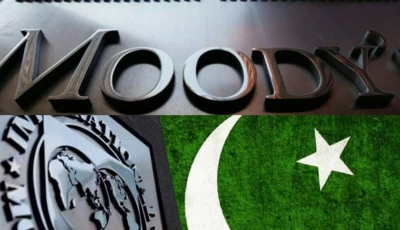ISLAMABAD, JULY16: The agreement reached at the staff level of the International Monetary Fund (IMF) enhances funding chances, although Moody’s Ratings noted on Tuesday that maintaining reforms is essential to reducing liquidity risks.
A staff-level agreement was made on July 12th, 2012, between the Pakistani authorities and the IMF for a 37-month Extended Fund Facility Arrangement (EFF) worth around $7 billion. The IMF Executive Board must approve the deal; however, a vote date has not yet been scheduled.
Pakistan’s (Caa3 steady) funding chances will be enhanced if the new IMF program is approved, which we anticipate is likely. In order to address Pakistan’s demands for external financing, the program will offer reliable sources of funding from the IMF and stimulate funding from other bilateral and multilateral partners, according to the agency.
According to the agency, Pakistan would be able to continuously release finance for the duration of the IMF program only if the government can maintain the implementation of reforms, which will result in a long-lasting reduction of the risks associated with government liquidity.
Wide-ranging reforms, including steps to increase the tax base, eliminate loopholes, and promptly modify energy pricing to restore the energy sector’s sustainability, are prerequisites for the new IMF EFF. Additional actions include enhancing the management and privatization of state-owned businesses, eliminating agricultural support prices and related subsidies, pushing forward with reforms pertaining to transparency, governance, and anti-corruption, and progressively liberalizing trade policy.
The execution of reform may be hampered by a return of social unrest stemming from the high cost of living, which may intensify due to increased taxes and potential changes to energy rates. Furthermore, there is still a chance that the coalition administration won’t have a solid enough political mandate to carry out challenging reforms on a regular basis.
Pakistan would require around $21 billion in external funding for its fiscal 2025, which ends in June 2025, and approximately $23 billion for its fiscal 2026–2027, according to an IMF assessment released in May. As of July 5, Pakistan has $9.4 billion in foreign exchange reserves, far less than what the country needed.
Pakistan’s external situation is still precarious, and it will need a lot of outside funding over the next three to five years. The nation is susceptible to inaccuracies in policy. The government’s capacity to implement reforms may be hampered by poor governance and strong societal conflicts, which might make it more difficult for it to finish IMF program evaluations and secure outside funding.
